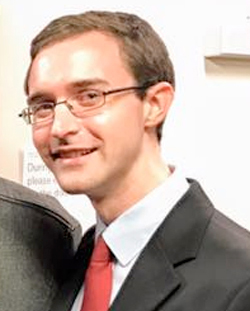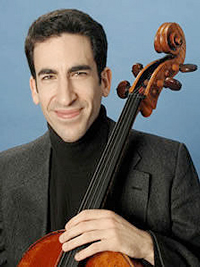by Mike Telin

In his composer notes, Theophilus Chandler (left), a 2014 Oberlin alum, says that in his Cello Concerto (2016) he “hoped to take the important lessons of the Romantic concerto tradition and apply them to the more understated sensibilities of the 21st century.” While he has obviously learned from those traditions, with this concerto the young composer has emerged with his own 21st-century musical voice.
Scored for thr
During the second movement, Chandler writes expansive, sultry flute section solos that are continuously re-colored as they float above the solo line. A short, accented chord in the orchestra once again finds the soloist on the run until the concerto ends quietly, its final note fading into the hall.
Conservatory cello professor Amir Eldan was tireless throughout. Playing with a dark, focused sound, his physical control was amazing as he dug into the many daunting technical passages that took him from the lowest to the highest ranges of the instrument as he seamlessly shifted from one musical mood to the other. Weiss and his ensemble were first-rate collaborators, always present but never overpowering. If this concerto is any indication, Theophilus Chandler is a composer to watch.

Meltzer’s setting of the sometimes odd text is always complementary — he either weaves the vocal line into the instrumental passages or has it act independently. His music also requires the soloist to make wide leaps and pick notes out of the air. Faculty mezzo-soprano Lorraine Manz’s performance of the 25-minute piece was enthralling. Singing with impeccable diction and discrete use of vibrato, Manz brought forth a full range of vocal colors.
She intoned, “You, too, are drifting, in spite of your course” sweetly in her high register, and sang, “Everywhere the spruce trees bury soldiers” with a dark, rich tone in her low register. Manz exhibited her vocal flexibility during many fast passages, especially during the final verse: accompanied by pizzicato strings, she was animated as she delivered the words “Not quite.”
Meltzer’s music is thoroughly engaging, and Manz, Weiss, and the ensemble brought out all the musical whimsy the piece has to offer.
Placed between the two large-scale compositions was Kristin Kuster’s twelve-minute, multifaceted Ribbon Earth (2008) for flute, clarinet, bassoon, two violins, viola, and cello. Written in three continuous movements, its inspiration was Brent Collins’s sculpture Pax Mundi, a continuous bronze ribbon which spirals into an abstract sphere, appearing to be both severe and delicate.
After a slow introduction, Ribbon Earth launches into a fast section with running lines in the strings and chirping winds. The forward-driving motion builds until the bottom drops out, giving way to slow, long bow strokes in the strings. Flutist Josephine Yoonji Lee, clarinetist Shelagh Haney, and bassoonist Corinne Crowley performed their solo roles with panache. Back in the fast lane, violinists Adam Jeffreys and Will Crock, violist Nicholas Gallitano, and cellist Eliot Haas joined their wind colleagues in bringing the spirited work to conclusion.
Published on ClevelandClassical.com November 21, 2017.
Click here for a printable copy of this article



